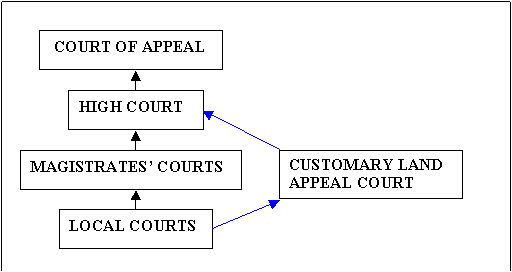
 |
[Home] [Databases] [WorldLII] [Search] [Help] [Feedback] [Report an error] [F.A.Q.] | |
Solomon Islands Courts System Information |
||
| You are here: PacLII >> Databases >> Solomon Islands Courts System Information | ||
Pacific Courts - Solomon Islands SOLOMON ISLANDS*

COURT OF APPEAL
· Has jurisdiction to hear civil appeals as of right:
· from any decision of the High Court sitting in the first instance, including decisions of Judges sitting in chambers;
· from any decision of the High Court under the provisions of the Islanders' Divorce Act;
· on a question of law only, from any decision of the High Court exercising appellate jurisdiction, provided that further appeal to the Court of Appeal is not prohibited by statute.
· Has jurisdiction to hear civil appeals from the High Court with leave:
· where an order was made by consent or is as to costs only;
· where the order or judgment is interlocutory, except in a case:
a) where the liberty of the subject or custody of infants is concerned;
b) where an injunction or appointment of a receiver is granted or refused;
c) where the decision determines the claim of any creditor or liability of a contributor of other officer under the Companies Act; or;
d) where a decree nisi in a matrimonial cause or a judgment or order in an Admiralty action is involved.
· No appeal lies from:
· a decision allowing an extension of time in which to appeal;
· an order giving unconditional leave to defend an action;
· a decision of the High Court which is provided by statute to be final, for example on appeal from the Customary Land Appeal Court; and
· from an order absolute for the dissolution or nullity of marriage, where the opportunity to appeal against the decree nisi has not been taken.
· A person convicted on trial before the High Court may appeal to the Court:
· as of right, against conviction on any ground involving only a question of law;
· with leave of the Court of Appeal;
· with the leave of the Court of Appeal against sentence unless it is one that is fixed by law.
· Has jurisdiction to hear 'further' criminal appeals which may be lodged by 'any party' on any ground involving only a question of law but excluding severity of sentence.
HIGH COURT
· Has unlimited original civil and criminal jurisdiction.
· Appeals lie to the High Court as of right from all civil judgments, orders and decisions of any magistrates' court except where it is made by consent, ex parte or relates to costs only. In those cases special leave of the Magistrates' court, or of the High Court is required.
· Hears appeals from the Customary Land Appeal Court on questions of law, other than customary law, or where failure to comply with a procedural requirement is alleged. The decision of the High Court is final.
· Has a criminal appellate jurisdiction which is defined in part IX of the Criminal Procedure Code. Appeals lie as of right. There is also an appeal by way of case stated.
MAGISTRATE'S COURTS
· Have civil jurisdiction:
· in claims in contract or tort, where the amount involved does not exceed SBD 2,000, or in the case of a principal magistrate SBD 6,000;
· in suits between landlord and tenant for possession of any land, where the annual value or rent does not exceed the sum SBD 500, or in the case of a principal magistrate SBD 2,000;
· to make guardianship and custody orders;
· to grant injunctions, orders for the detention or preservation of any property;
· orders to restrain torts or breaches of contracts, or similar relief;
· to address claims for relief by way of inter-pleader in respect of land or other property attached in execution of a decree by any magistrate provided the value of the land or other property concerned does not exceed SBD 500 or SBD 2,000 in the case of a principal magistrate;
· to enforce its orders by attachment and sale or delivery; and
· to make a committal order of up to six weeks against a person with the means to pay, who fails to comply with a court order for payment of an order or judgment.
· The civil jurisdiction of second class magistrate is limited to cases involving a maximum of SBD 200.
· Do not have jurisdiction to deal with:
· suits where the title to any right, duty or office is in question;
· suits where the validity of any will, or testamentary writing or of any bequest or limitation under any will or settlement is in question;
· suits where the legitimacy of any person is in question;
· suits wherein the validity or dissolution of any marriage is in question;
· actions for malicious prosecution, defamation, seduction or breach of promise of marriage;
· actions where the title to land or ownership of land is disputed, except where the parties consent.
· The criminal jurisdiction of the magistrate's courts varies according to the class of magistrate. All classes of magistrates have jurisdiction to try criminal matters summarily.
· A principal magistrate's court has criminal jurisdiction in relation to the following:
· offences that carry a punishment of 14 years' imprisonment or a fine or both;
· offences which have been expressly made subject to the principal magistrates' jurisdiction by law; or
· offences that have been expressly provided to be triable summarily.
· A principal magistrate may only impose a term of imprisonment of five years or a fine of $1,000 or both.
· First and second class magistrate's courts have a lesser jurisdiction. Magistrates in these classes may summarily try any offence which carries a maximum punishment of imprisonment for one year or a fine of $200, or both. In addition, they have jurisdiction to try any other offence where such jurisdiction is expressly granted by law or it has been provided that the offence may be tried summarily.
· The magistrate's courts also have jurisdiction to hear appeals from decisions of the local courts operating within that specified area.
LOCAL COURTS
· Have civil and criminal jurisdiction over causes and matters in which all parties are islanders resident or within the area of the jurisdiction of the court.
· As a prerequisite to the exercise of jurisdiction the court must be satisfied that:
· the dispute has first been referred to the chiefs;
· all traditional means of resolving the dispute have been exhausted; and
· no decision wholly accepted by both parties has been made by the chiefs.
· Have exclusive jurisdiction to deal with all proceedings of a civil nature affecting, or arising in connection with, customary land other than:
· matters expressly excluded by the Land and Titles Act; and
· questions as to whether land is or is not customary land.
· Have jurisdiction to deal with any matter of a civil nature referred to it by the High Court or a Customary Land Appeal Court under the Land and Titles Act. Its decisions on such matters are subject to appeal to the Customary Land Appeal Court.
· Have jurisdiction to enforce their civil decisions by attachment and sale or delivery or committal for up to six weeks.
· The specific criminal jurisdiction of the local courts extends to the hearing, trial and determination of all criminal charges relating to offences specified in the schedule to the Order or under the provisions of any by-law made by any local government council.
· May pass sentences ordering imprisonment for a term not exceeding six months or imposing a fine not exceeding two hundred dollars. Punishment must not be repugnant to natural justice and humanity and the fine or other punishment shall in no case be excessive but shall always be proportionate to the nature and circumstances of the offence.
CUSTOMARY LAND APPEAL COURT
· Is a separate appeal court which has been established to deal with customary land appeals.
· Applies customary law.
· Hears appeals relating to land from the Local Courts.
· Its decisions are subject to appeal to the High Court on a point of law only.
PacLII:
Copyright Policy|
Disclaimers|
Privacy Policy |
Feedback
URL: http://www.paclii.org/sb/courts.html